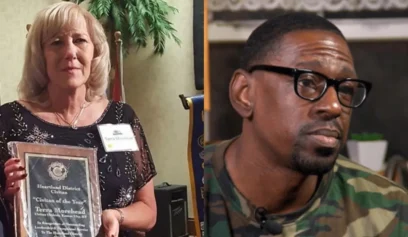“I don’t know what we have to go through for somebody to care” — Kareen Ulysse, founder of the Centre Hospitalier de Fontaine Foundation.
As a refugee from Haiti who now calls the United States home, Ulysse, 31, has a great deal of empathy for Haitians on the island and now massed at the southern border in the tiny Texas town of Del Rio across the Rio Grande from Mexico.
Ulysse returned to Atlanta from Haiti over the weekend after helping with relief efforts following last month’s earthquake that killed more than 2,000 people. Her nonprofit organization, provides assistance and resources in health care and underfunded schools.
“We sent two doctors, two nurses, and three nurse’s aides to the south to do some work and every week we’ve been sending small teams to the south,” said Ulysse.
Ulysse says the island still needs plenty of help with everything from medical equipment to durable tents as many Haitians near the epicenter of the 7.2 magnitude earthquake lost their homes.
Unlike the 2010 earthquake, Ulysse says this time around more Haitians are stepping up to help rebuild rather than wait on large relief organizations such as the Red Cross, which, according to a 2015 ProPublica report, raised half a billion dollars following the 2010 earthquake disaster, but only managed to build six homes, leaving many people questioning where did all the money go.
“The Haitian response was great, but that’s not who you’re going to see in the news at all, it’s not us. The Haitian response was amazing this time around,” said Ulysse.
Despite recovery efforts, Ulysse says the country is still a dangerous place to be in.
“The tension is bad, these kids are out of control, these gang members are out of control. There is no government, there is no one to keep them in check,” she said.
Knowing firsthand the challenges in Haiti, Ulysse is saddened to see the current crisis at the southern border, where an influx of thousands of Haitian migrants over the past week has created a huge makeshift camp of asylum seekers sheltering underneath a bridge that spans the Rio Grande from Ciudad Acuña, Mexico, to Del Rio, Texas.
“They left Haiti, they went to Chile or Brazil, where they describe the horrible conditions, the racism there is off the chain, so they migrated two months to make it to this point and then you’re not even giving them due process you’re just shipping them, and I’m a political refugee myself, I came here in 2004 so I know what they’re running from,” said Ulysse.
The Haitian earthquake struck on Aug. 14, 2021, two days before the United States ramped up efforts to withdraw from Afghanistan. Now that the United States is welcoming about 40,000 Afghan refugees, comparisons are being made with the Haitian migrants as they too are escaping violence and political strife.
“They’re coming over for the same things,” Dr. Jonathan Collins said.
Collins, an assistant professor of international and public affairs and education at Brown University added, “They have been living in Central and Latin America for a couple of years now.
They are trying to find jobs and economic opportunity but they’re in countries like Brazil, Chile and Ecuador and racism is impacting them, they’re not able to find long-term career opportunities and economic opportunities so they hear about what’s happening in the U.S., the Biden-Harris administration are granting this permanent stay to folks who are already there well maybe I can go.”
Upon taking office, the Biden administration proposed the Citizenship Act of 2021, which would allow more new immigrants into the country and create a pathway to citizenship for immigrants already living in the United States.
Collins says the Biden administration’s handling of the Haitian migrants at the border will be tricky, with many of his core constituents paying close attention.
“They are clamping down at the border and trying to prevent as many of those Black Haitians from entering the country as possible, and so who is going to be the champion for them?” Collins asked. “Who is going to create some sort of outrage on their behalf, and it’s not quite clear who their activists are.”
Some activists are beginning to speak out. In a press statement sent by Gurline Jozef, co-founder and executive director of the Haitian Bridge Alliance criticized the Biden administration:
“For too long, U.S. immigration policies have been to bar Haitians from seeking asylum. From Guantanamo Bay to the heightened use of detention centers in the 1970s, and the metering policy, it is disappointing to see that this administration chose to continue with this same narrative.
At this time, we also stand with our brothers and sisters seeking safety in Del Rio, where it is believed that most will be deported. All flights must be stopped, and the Administration must be held accountable for their actions.”
As for Ulysse, she plans to continue doing her part by providing support for Haiti. Despite the dire conditions on the ground, she is hopeful this time around following the earthquake things will be better on the other side.
“We still have a long way to go, but our people, we’re trying, we just wish we had a government to back us,” said Ulysse.


